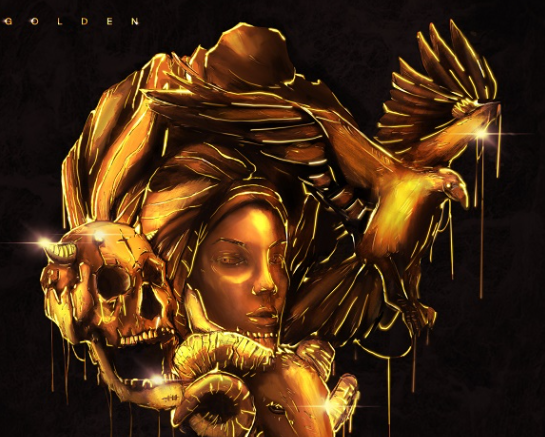From entertaining people to empowering and transforming lives; music is undoubtedly an integral tool for social change. The centrality of music to societal advancement is the thrust of ‘Golden‘, a newly released album by Gilbert Bani, the Nigerian rapper better known as A-Q.
The 7-track project, released last week Friday, comes on the heels of the success recorded by ‘God’s Engineering’, the 2020 album that won him ‘Best Rap Album’ at the 14th Headies awards.
On the new record, the 34-year-old rapper addresses relevant and germane issues that are consequential to every human, with a particular focus on Nigerians.
TheCable Lifestyle examines five major themes in ‘Golden’.
Delay not denial — A-Q preaches hope in ‘Abraham Blessings’
The rapper kickstarts the project with ‘Abraham Blessings’ — a track that dwells on the biblical teachings about Abraham, a prominent character in the Bible.
A-Q must have intentionally named the first track ‘Abraham Blessings’, a fantastic biblical allusion demonstrating the rapper’s insightful knowledge of the Holy Bible. He, however, tries not to make it difficult for the layman to understand.
The track comes with lines like: “delay is not denial”, “waited for God’s call and now it’s game time” and “trial became triumph” which all portray the reason why Abraham is called the “father of faith”.
Everything about Abraham’s blessings in the Bible happened late and it appears A-Q feels some kind of connection, being a 34-year-old rapper who is just enjoying the rewards of his labour in the hip-hop landscape.
Also, being a humanist, he realises that he isn’t the only one on this table, and as such, teaches men to hold on to their faith and stick to noble convictions.
This is coming at a time when the concept of hope itself is seriously needed by Nigerians who are grappling with bad governance, poverty, unemployment, banditry, kidnapping, among other challenges.
Revolution and youth involvement in social change (Shoot the Messenger)
A-Q tries to be careful with this theme. Not too many Nigerians are oblivious of what transpired at Lekki tollgate but diverse views have eroded its significance. A-Q tries to make a difference.
The conscious rapper dipped into his bag of adulation for some young celebrities who actively participated in the protest aimed at ending police brutality and also gave a glimpse of political revolution in Nigeria.
He mentions celebrities such as Runtown, Falz, Oxlade, and Mr Macaroni. The rapper does this to encourage youth participation not only in the protest but also in politics, civil society organisations, and other bodies contributing immensely to the betterment of Nigeria.
I’m on a mission — A-Q dares death in (HeLa)
This is probably the deepest theme considering the fact that it addresses a uniform but scary concept of death.
He borrows largely from John Donne’s ‘Holy Sonnet’. The British poet, in the first two lines of the poem, said: “Death, be not proud, though some have called thee mighty and dreadful, for thou art not so.”
In ‘HeLa’, A-Q, like Donne, adopts figurative language with the use of an apostrophe, a literary device that addresses something not present as if it is.
“Conversation with death“, he rapped, adding that, “I tell you when it is time, you can’t take me just yet”. These are statements that are profound and independent of fear but stated with clear understanding and consciousness.
“I’m on God’s mission, the revelation is blessed”. To death, A-Q commands, “I’m on a purpose of reformation and emancipation of minds. You have to wait till I achieve this before you take me, and even if you object, you have to let me know before you strike”.
He believes in this conviction so much that he regards himself as immortal when he says: “Mere mortals may I never die with you.” And like God said in Psalms 82:6, “Ye are Gods”.
Class struggle and inequality (System Failure)
Lines like “we fight for equality but it’s the class that kill us more”, “rich, middle class, poor, time to take the mask off” demonstrate the inherent class struggle, bureaucracies, and poor policies that stifle Nigeria’s progress.
“Some of us break the law to survive and say the system makes them do it” — a statement often used by unpatriotic citizens to justify their bad, and corrupt values.
A-Q, however, clearly differs from claims that only the government is responsible for society’s problem. The rapper charges the citizens to also take responsibility.
He also talks about healthcare and how poverty has aided vile education, eroded values and has led many to indulge in detrimental iniquities.
The bondage of freedom of expression (Read the Room)
The track starts by sampling Barack Obama’s perspective on social media, activism, and freedom of expression.
A-Q assumes the role of a leader and decries cyberbullying — the act of making fellow humans inferior on social media, castigating them for their opinions and promulgating ours as superior.
“When social media comes for you, you won’t survive it.. for speaking your views, they will silence you”, A-Q raps.
He also elucidates his point using Obama’s popular quote: “If all you’re doing is casting stone, you probably won’t go that far.”
Copyright 2024 TheCable. All rights reserved. This material, and other digital content on this website, may not be reproduced, published, broadcast, rewritten or redistributed in whole or in part without prior express written permission from TheCable.
Follow us on twitter @Thecablestyle

